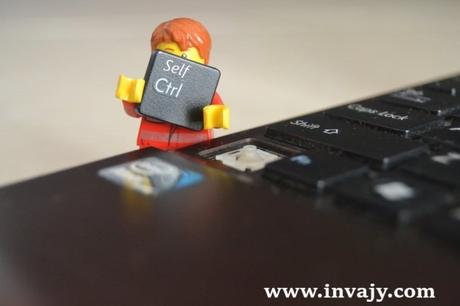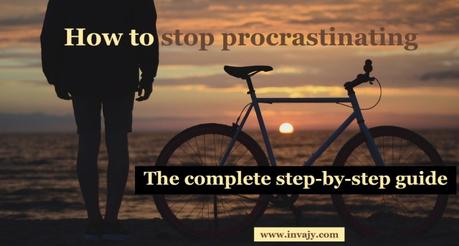For as long as humans have been around, we have been struggling with delaying, avoiding, and procrastinating on issues that matter to us and are extremely important in life. Everyone procrastinates including me, you and even the person who is sitting in next door building to you. Procrastination is one of the challenges, which knowingly or unknowingly, we all face at one point of time or another in life. Studies show that over 20 percent of the adult population put off or avoid doing certain tasks by allowing themselves to be overtaken by distractions. Today, in this complete step-by-step guide we’re going to talk about how to stop procrastinating.
What is Procrastination?
Let us try to understand what exactly is procrastination? If you search in Google , it tells you that procrastination is “the action of delaying or postponing something.” That’s sound pretty simple and not that serious, isn’t it? But in reality, procrastination is serious.
Piers Steel, a professor of psychology at the University of Calgary in Alberta and the author of the book The Procrastination Equation: How to Stop Putting Things Off and Start Getting Stuff Done, defines it as “Procrastination is to voluntarily delay an intended course of action despite expecting to be worse off for the delay.”
In simple words, procrastination is doing more comfortable and pleasurable things in place of less comfortable ones. It results in that important tasks are postponed to a later time. Procrastination is basically an avoidance strategy. Procrastinators choose to do something else instead of doing what they need to do. Because it’s much easier to choose and remain in comfort zone.
Reasons for procrastination
OK, with the definitions given above, you have a bit of understanding about what is procrastination. Now a question in your mind must be going on, why do we procrastinate? To know why people procrastinate is good opportunity to bring some science into our discussion and look in to the causes or reasons for procrastination.
Diminished Self Control
Self-control is generally considered to be a matter of will power, but one study revealed that self-control of human beings is limited. In a study done on self-control by Dr. Roy Baumeister, a psychologist from School of Psychology – University of Queensland, it was found that just like any muscles, human’s self-control is a limited resource that can quickly become exhausted. When the self-control is close to being diminished or exhausted, human tend to choose what’s more pleasurable– the tasks providing immediate gratification instead of the actual works.

Time Inconsistency
Behavioural psychology research has revealed a phenomenon called “time inconsistency,” which helps explain why procrastination seems to pull you back to start any work in despite your good intentions. Time inconsistency is the inclination of the human brain to value present or immediate rewards more highly than future rewards.
Let’s take a bit deeper penetration of time inconsistency. Imagine there are two YOU within you: One is your present YOU and another is your Future YOU. When you set goals for yourself, say for example starting a new start-up or start blogging or quitting smoking or losing weight or implementing an initiative in job or writing a book or learning a new language — you are actually making plans for your Future YOU. You are looking at how you want your life to be in the future. Behavioural science research has revealed that when you think with your Future YOU, it is quite easy for your brain to see the value in taking actions with long-term benefits and rewards. The Future YOU comes into action and values long-term benefits and rewards.
Here comes the tricky situation for your brain, while the Future YOU can set goals, only the Present YOU can take the initiative for action. When the time comes to make a decision for taking an action, you are no longer doing it with your Future YOU. Now you are in the present moment, and your brain is thinking with your Present YOU. Researchers have discovered that the Present YOU really likes instant gratification, not long-term rewards.
The Present YOU and the Future YOU are usually at odds with each another. The Future YOU wants to be slim, trim, and healthy, but on the other hand the Present YOU wants a cheesy pizza, candy or donuts. For sure, everyone is aware you should eat healthy today to avoid being obese in next 10-15 years. But consequences like an obesity with the increased risk of diabetes or heart problems are years away. Your Present YOU dominate and your brain values the immediate pleasure in eating that cheesy pizza, candy or donuts.

This is one reason why you might go to bed feeling motivated to make a change in your life, but when you wake up you find yourself falling back into old patterns. Your brain values long-term benefits when they are in the future (tomorrow), but it values immediate gratification when it comes to the present moment (today).
Perfectionism
Do you set very high standards? Do you expect a lot from yourself, day-out and day-in? You may feel proud on being perfectionist but some behavioural scientist believes one of the reasons of procrastination is excessive perfectionism. If you are a self-confessed perfectionist, then you might find it difficult to take action until and unless you know that you can do a job perfectly, with which you will get totally satisfied. Believing that the only good task is a perfectly done task will make it hard to start and finish anything.
Perfectionism often triggers the evaluation anxiety and fear of failure. Family expectations and standards set by parents, boss or society may be so high that you could not actually live up to them with perfection. Thus, procrastination steps in to derail expectations and standards set by others and prevent you from “really” failing.
Fixed mind-set
Carol Dweck, a professor of psychology at Stanford University and author of the book Mindset: The New Psychology of Success, explains that people either have a fixed mind-set or a growth mind-set. Those with a fixed mind-set believe that their abilities are set in stone, so they only focus on their current intelligence or talents, believing they cannot be developed. Whenever any new task or challenge comes across in front of them that demands enhancement of skills, knowledge, talent and stretching their abilities, their fixed mind-set triggers procrastination. They believe that they were born with what they have, and they can’t improve upon their abilities. They think – I can’t do this, so I won’t try.
Fixed mind-set also has connection with perfectionism which we have already discussed as one the cause of procrastination. According to Hillary Rettig, the author of The 7 Secrets of the Prolific: The Definitive Guide to Overcoming Procrastination, Perfectionism, and Writer’s Block, people who procrastinate due to perfectionism tend to have a fixed mind-set.
Habit
Well few people consider that procrastination is just a bad habit. You many have grown up in an environment where you have seen people procrastination every now and then. May be, your father, mother, siblings, or some of relatives have kept procrastinating in their life. It has come in your life as legacy and got converted in one of your bad habit .
Mental Health
As we discuss above that procrastination is just a bad habit, but for many people, procrastination is more than a bad habit; it’s a sign of a serious underlying mental health issue. For example, OCD, ADHD , anxiety, and depression are associated with procrastination.

Mental health issues such as Depression/ anxiety/ fear of unknown (or any other mental illness conditions) cause you to delay in taking initial action. Most of the mental health issues badly affect and diminish your self-confidence motivation, concentration, and perseverance. All these result in procrastination.
Lack of Interest
Lack of interest seems to play an important role in procrastination. It has been observed that few people procrastinate on the work or task in which they don’t have any interest. Particularly students in schools and professionals at workplace procrastinate due to lack of interest. They feel that stuff is just too boring.
Life Style
Another frequent reason for procrastination is unhealthy lifestyle. People with relatively unhealthy lifestyles generally have low energy levels. If your physical energy levels are lacking, then it becomes reason to procrastinate and you will not feel like doing much at all. Whether you go to sleep late night and get insufficient sleep to “recharge your batteries” or your unbalanced diet causes you to feel tired and sluggish, lifestyle factors can play a major role in how inclined you are to get up off the couch and take action. It is the case where the mind is willing but the flesh isn’t.
Tips to Stop Procrastinating
We have gone through the most probable causes of procrastination or reasons of procrastination. Let’s now move towards the tips on how to avoid procrastination or how to not procrastinate.
Just Start
Procrastination is not waiting and it is more than delaying. The key is to just start. It’s an old phrase “Well begin is half done”. Have you ever noticed the importance of beginning? And it’s often the very first step that’s the hardest step to take? The biggest problem with procrastinators is they do not begin.
Let us see exactly what happens during the moment when you finally break the shackles of procrastination and take action. For an example, let’s consider you have to make few presentation slides for the business review meeting scheduled next month. You’ve known about it for weeks and continued to avoid making it day after day. After one week, you will start to experience a little bit of anxiety and distressing pain thinking about this presentation you have to make, but not enough to do anything about it. Then, suddenly, a couple of days before the deadline, the future consequences turn into present consequences, and you start making presentation slides and complete few hours before it is due.
The problem is not doing the work, it’s starting the work. If you want to stop procrastinating, then you need to make it as easy as possible for the Present YOU to get started and trust that motivation and momentum will join after you begin.
Bring the Consequences of Procrastination to Present moment
We have discussed above the one of the reasons of procrastination is time inconsistency. You have to find a way to move future rewards and punishments into the present moment. You have to make the future consequences become present consequences. It will help you to conquer procrastination and kick start.
Come back to the example, where you were supposed to make presentation slides for the business review meeting. The cost of procrastinating on delay for making presentation slides only becomes painful after few weeks of lazy behavior. Now in this example how will you move future rewards and punishments into the present moment?
If you commit to make the presentation slides before 10 AM of Friday morning and requesting your immediate boss for guidance on draft presentation slides. The cost of procrastinating on making the presentation slides becomes more immediate.
Put the Big Rocks in First
Remember the story of Jar and Big rocks, shared by Stephen Covey in his book, First Things First. If you have not read that story, please go through this article – Is the Jar of your time Full?
You need to identify the most important priorities in your life – both professional as well as personal. Stephen Covey termed this the “Big Rocks” principle. If you start your day (Jar of time) without a concrete plan, you’ll sooner or later get busy filling it with sand (less priority) or water (no priority but important). Before you know it, your Jar is full, and you have already spent another day working on things that have little value to you. You need to manage your Jar of time and put the big rocks (important and top priority tasks) first. Practicing this you will be able to ensure important and top priority tasks do not fall into the territory of procrastination.
Time Management Techniques
Adopt few time management techniques, which will help you to conquer the procrastination. I have written a complete separate article on Techniques of effective Time Management. Time management techniques which will definitely help you to focus on the things on which you procrastinate are as under

- Planning and making to do list
- Setting your A, B, C of priorities
- Being realistic in your expectations
- Learning to say “No”
- Managing interruption
- Using the waiting time are some of the
Visualization
The visualization exercise seems simple, but some recent research suggests that visualizing yourself in the future could be an innovative way to beat procrastination. We have already discussed above to bring the consequences of procrastination to present moment to combat procrastination. This basically helps you to deal the time inconsistency which has been one of the major causes of procrastination. Visualization is just an opposite approach. Here you try to visualize the future rewards and consequences and overlap your Present YOU with Future YOU. In other words, you try to live in future and use the rewards and consequences as stimuli for motivation to kick start at present.
Coming back again to example of making presentation slides for business review meeting. If you imagine yourself giving a killer presentation at business review meeting because you prepared the presentation slides couple of weeks in advance and had enough time to fine-tune what you were going to say. You might be inclined to do that rather than setting yourself up to fumble through a presentation you were ill prepared for, because you didn’t start planning until the night before after a few Happy Hour cocktails.
Try projecting yourself mentally into the future. Imagine the good feelings you will have if you stop procrastinating and finish a project.
Break Down Tough Projects or Jobs
Huge projects or jobs can be overwhelming, causing you to keep putting them off. Breaking bigger projects or jobs into manageable chunks. And thereafter tackling one thing at a time is the quickest way to make sure that they actually get done.
Keep monitoring every achievement of such small manageable chunks of project. You’ll feel a sense of progress while still working. Reward yourself at every such small achievement. I reward myself by watching my favorite movie or hanging out with friends. Whatever reward you choose, make sure it’s something you love.
Develop growth mind-set
You can overcome procrastination to the extent you can shift your thinking to consider the situation as an opportunity for growth, development or to deepen your talents. Shifting mind-set from fixed mind-set and cultivating the habit of growth mind-set will not only help stop procrastinating but also to open the new path of success in life. The growth mind-set creates a desire to learn and an ability to overcome problems in order to be successful.

Healthy Life style
We have already discussed how an unhealthy lifestyle results in low energy level resulting in procrastination. Healthy life style will not only help you to overcome procrastination, but there are many other benefits will improve your overall physical as well as mental health. Bring change and work on developing a healthier lifestyle. Do some Experiments with sleep, exercise, and diet to find a balance that works for you. If you cannot get any positive results (in terms of boosting your energy levels), then consider visiting and consulting a healthcare professional. It may be the case there are underlying causes of low energy that require comprehensive medical treatment.
Avoid Instant Gratification
Instant gratification is curse of modern society. The new age technology and inventions social media and dating apps, have changed people into lazy beasts.Why bother with writing a few pages of a book, when you can try a new battle game PUBG on smartphone? Human beings automatically choose the easy way. They try to experience a brief moment of joy, instead of suffering the pressure of inevitable responsibility.
The more you become addicted to instant gratification, the easier it becomes to indulge in it. Avoid the temptation that’s standing right in front of you. So you can hold out for something substantially better down the line. Practice emotional management and surround yourself with people who encourage you and push you. It will help you to overcome instant gratification.
I hope you found this guide on procrastination useful. Feel free to leave a comment below in the comment section. How do you overcome procrastination? I look forward to hearing from you.
